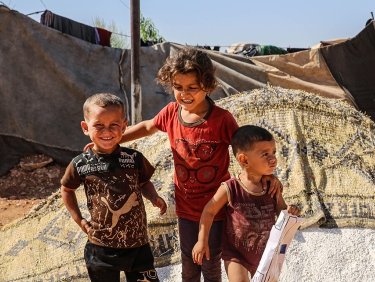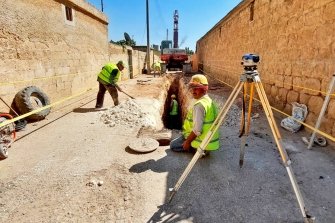

Emergency aid for refugees, internally displaced persons and people affected by the earthquake
Syria remains in the grips of a complex humanitarian crisis, which was further intensified by the earthquake on 6 February 2023. This event plunged the country into even deeper misery. The crisis is characterized by the long-term consequences of over a decade of conflict: a divided country, widespread destruction, unexploded ordnance, and the highest number of internally displaced persons in the world. The continuous deterioration of the economic situation, compounded by the impact of sanctions, has further increased the needs and vulnerability of the population. HEKS/EPER has been providing emergency aid in Syria since 2017.
According to the Humanitarian Needs Overview, 15.3 million people in the Middle East required humanitarian aid in 2023, an increase of 0.7 million compared to 2022. The interference of foreign countries, the politicization of aid and the decline in donations are further challenges that need to be overcome in this highly sensitive context.
The violent earthquake on the Turkish-Syrian border on 6 February 2023, caused destruction and even more suffering for the people affected in Syria. HEKS/EPER has been present in the earthquake regions in northern Syria for years and responded quickly. Just a few hours after the earthquake, HEKS/EPER and its local partner organizations, organized accommodation, and emergency aid for thousands of families.
Unstable security situation and great poverty
In the Global Peace Index, Syria ranked third to last among the world's most peaceful countries in 2023. Although widespread hostilities have subsided since mid-2018, the security situation remains extremely unstable and prone to escalation. The situation near the frontlines is particularly precarious, leading to new displacements. The dire economic situation, combined with the increasingly poor functioning of basic services in return areas, is influencing people's decisions as to whether they should return to their homes or leave the country like many others.
The economic conditions in Syria are deteriorating drastically: sanctions and ongoing internal problems have favored the emergence of a war economy. Inflation, currency devaluation, rising prices, increasing domestic debt and the widespread loss of jobs have led to additional sections of the population falling into humanitarian hardship. Over 90 percent of the population live below the poverty line. More often than before, households in Syria are resorting to negative coping strategies such as child labor, child marriage and the sale of productive assets. In 2023, 15.3 million people (two-thirds of the total population) require food aid, jeopardizing the food security of 12.1 million individuals.
Emergency aid for those affected by the earthquake in Syria
The devastating earthquake has plunged the people on the Turkish-Syrian border into even greater misery. HEKS/EPER not only carried out immediate measures directly after the earthquake but is also actively involved in the long-term recovery and stabilization of the war-torn country. The focus here is on rebuilding the infrastructure and economic resilience.

HEKS/EPER in Syria
HEKS/EPER has been working with local partner organizations in Syria since 2017 and also opened a country office in 2021 to implement humanitarian aid. Since 2022, humanitarian aid has focused on the sustainable restoration of basic services in the country with the following three strategic pillars: 1 bread (rehabilitation of public bakeries), 2 water (improvement of drinking water supply) and 3 work (integration of vulnerable people into the labour market).
On this basis, HEKS/EPER is carrying out humanitarian aid projects to support vulnerable people in the earthquake-affected areas in the north of the country - governorates of Aleppo, Latakia, Hama and Tartus - as well as in the governorates of Rif Dimashq (Damascus area) and Deraa.
Due to the deteriorating conditions in Syria, HEKS/EPER's work is focused on:
- ensuring sustainable access to drinking water and sanitation networks, combating the causes of waterborne diseases, and preventing their spread. This is why, in addition to rehabilitating water infrastructure, we are also promoting handwashing awareness and distributing soap for this purpose.
- supporting the production of subsidized bread. By rehabilitating public bakeries in the most vulnerable neighborhoods, one bakery can supply an average of 52,000 people a day with bread and thus make a significant contribution to food security.
- Rehabilitating three rural development centers and a vocational training center for people with disabilities in the Latakia and Aleppo governorates.
In 2024, HEKS/EPER plans to expand its support for the affected population in the Latakia and Aleppo governorates. To achieve this, HEKS/EPER will rehabilitate public infrastructure to secure livelihoods and offer vocational training and entrepreneurial skills to the local population, thereby enhancing their livelihood security.
HEKS/EPER is using its experience and expertise to develop programmes for rapid rehabilitation and to introduce innovative measures that will lead to long-term development cooperation. We continue to rely on your support for this.
Last updated: January 2024
